
Electrical Protection in the Solar Era: How to Choose Fuses for Modern Photovoltaic Installations
With many companies focusing on net zero and generally reducing emissions, solar energy has become a pillar of the global energy transition. Exponential growth in solar farms and self-consumption installations, due to reduction in solar panel costs, rising energy costs and decarbonisation policies, brings a key need for ensuring systems are safe, efficient and durable. Photovoltaic fuses are at the forefront of this crucial role.
The experts at OEM Automatic have broken down the role of photovoltaic fuses and their contribution to solar systems, as well as, how to choose the right solution for you.
Why is adequate protection important in solar applications?
Solar installations operate primarily in DC (Direct Current), which introduces additional challenges compared to traditional AC (Alternating Current) systems.
Key risks to consider in DC solar installations:
- Persistence of the energy source
- Solar panels continuously generate electricity for as long as they are exposed to sunlight, even in the case of a fault
- Difficult arc interruption
- DC currents have a much more stable electric arc, which is harder to interrupt than AC currents.
- Environmental conditions
- Environmental conditions can take a big toll on solar installations, systems are exposed to heat, humidity, UV, dust and other factors that can affect the system.
A fault in the circuit without adequate protection can cause costly damage to equipment (panels, inverters, batteries and more). Also, creating the risk of fire, endangering people, wildlife and infrastructure.
Photovoltaic applications without specifically designed fuses, certified for DC currents, make the system vulnerable to serious and unpredictable failures.
Learning hubWhat are photovoltaic fuses?
Photovoltaic (PV) fuses, also known as solar fuses, are specifically designed, specialised safety devices, used to protect solar installations, inverters and other components, from damage caused by overcurrent, short circuits and other electrical faults.
PV Fuses act as a safety mechanism in solar powered installations, by interrupting the flow of electricity when a fault occurs, breaking the circuit.
Where are photovoltaic fuses installed?
Fuses must be positioned at key points in the installation:
- At each string
- Preventing a fault in one string affecting others
- Protecting the cables and the entire installation.
- In combiner boxes
- Where strings are grouped before reaching the inverter
- This is typically where fuse holders are installed
- Inverter protection
- A short-circuit at the inverter can be catastrophic if not properly protected.
- Battery systems
- Hybrid systems with storage require dedicated DC fuses on the battery side.
Proper fuse placement and sizing minimise downtime and enhance the overall safety of the installation.
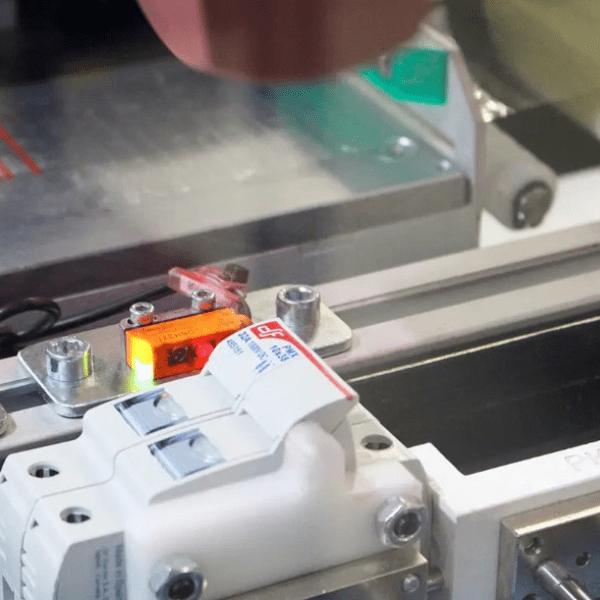
Why use fuses over other protection devices?
There are several ways you can protect a photovoltaic circuit, such as circuit breakers, however, fuses designed specifically for photovoltaic applications offer clear advantages:
- Response time
- Fuses react in milliseconds, this ultra-fast response time limits damage to a minimum.
- Simplicity & reliability
- Fuses have no moving parts or complex mechanisms, making them easy to install and not prone to wear.
- High breaking capacity
- Having a high DC breaking capacity is especially important where voltages reach above 1000 VDC, where arcs are harder to extinguish
- Cost-effective & easily replaced
- Virtually maintenance free and spare parts or replacements are low-cost compared to other devices.
Fuses also fulfil regulatory functions; they are mandatory in string and inverter protection panels.
Key considerations when selecting photovoltaic fuses
Fuses should not be selected at random but carefully considered for your application.
Selection of a fuse must be based on:
1. Rated DC voltage
Application plays a large part in the voltage requirements.
Typical voltages in different systems:
- Residential: up to 600 VDC
- Commercial and industrial: up to 1000 VDC
- Utility-scale plants: up to 1500 VDC
To improve efficiency and prevent losses, photovoltaic systems operate at increasingly higher voltages, fuses must be able to handle these voltages.
2. Rated current
Fuses must be sized about the maximum nominal current of the string or protected circuit, whilst still being sensitive enough to operate in the event of a fault.
This requires further system study, knowing expected short-circuit currents, module characteristics and operating conditions.
Apply a 125% margin over the maximum string current when selecting a fuse.
3. Breaking capacity
Solar systems with parallel strings, have increased fault currents due to all healthy strings feeding into a short circuit point, when one occurs. Fuses must be capable of interrupting these currents without sustaining the arc.
4. Compliance
Complying with regulations and standards is important.
Fuses in photovoltaic applications must comply to IEC 60269-6, a standard specific to solar applications. Fuses with this accreditation have been tested and validated to operate in direct current under the working conditions of a photovoltaic application.
Where are photovoltaic fuses used?
1. Photovoltaic Strings
DF Electric’s gPV cylindrical fuses are made for PV string protection up to 1500 V DC with a 30 kA breaking capacity, compliant with IEC & UL standards.
Available sizes:
- 10x38 mm / 14x51 mm (1000–1100 V DC)
- 10x85 mm / 10/14x85 mm (1200–1500 V DC)
- 22x65 mm (up to 1500 V DC)
Features include:
- High thermal shock-resistant ceramic body
- Silver-plated copper contacts & pure silver fuse element
- Wide temperature range: –40 °C to +80 °C
- Compatible with PMX PV holders, with optional visual indicators for blown fuses
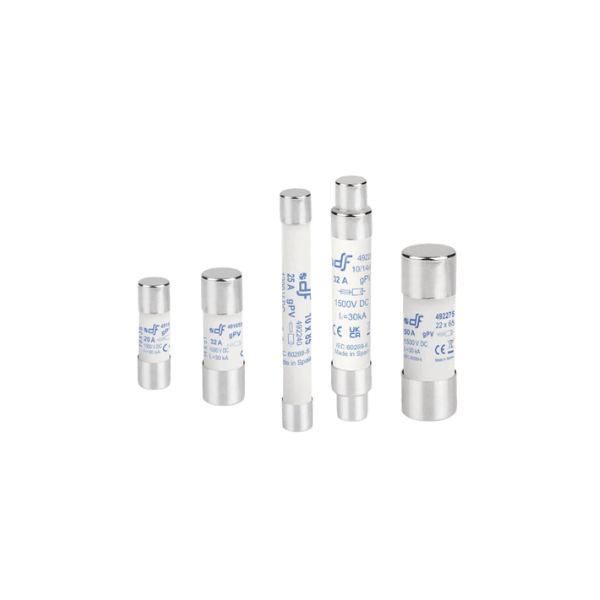
2. Medium-Power Solar Arrays & Fields
The NH gPV range is ideal for medium-power PV fields up to 1000 V DC, with options for striker contacts to enable remote fuse status monitoring.
Key include:
- Fast-acting: trips at 1.35 In, holds at 1.13 In
- Operates from –40 °C to +80 °C
- Robust ceramic body and silver fuse elements
- Fits NH ST fuse bases, with DIN rail or screw mounting
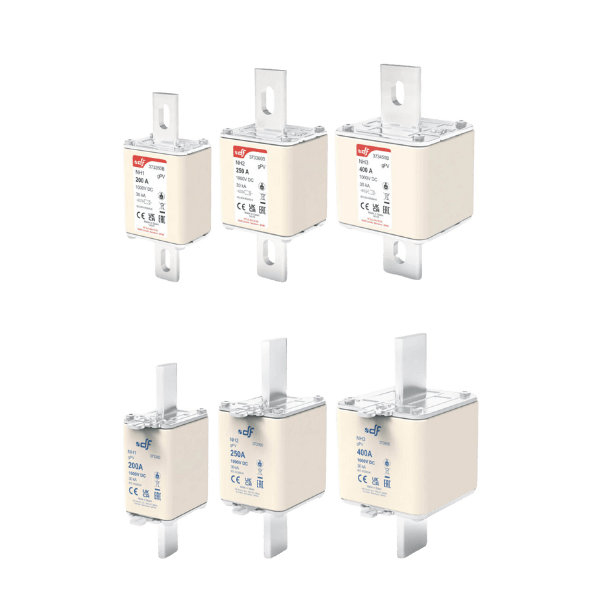
3. High-Power Strings & Inverter DC Inputs
For large-scale PV systems, the NH XL gPV fuses protect up to 1500 V DC, with current ratings from 40 A to 500 A and breaking capacities up to 100 kA.
Features include:
- Available with standard blades or striker contacts for diagnostics
- Same fast-acting protection (1.35 In / 1.13 In)
- Built for extreme conditions: –40 °C to +80 °C, ceramic body, low power loss
- Compatible with standard NH bases
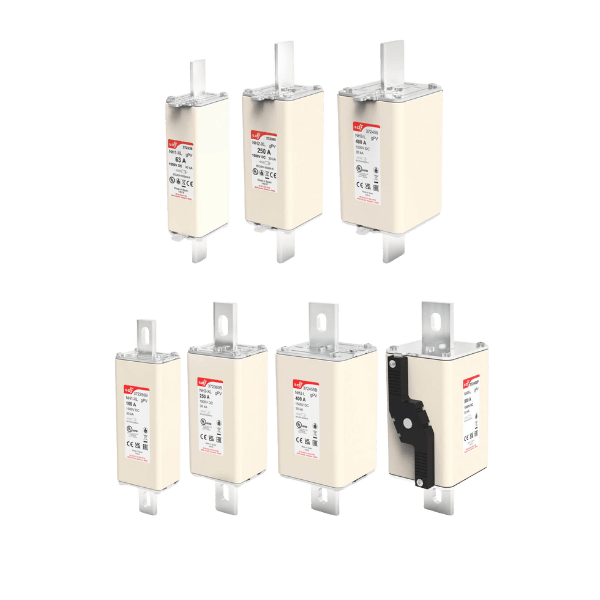
5. New-Generation String Inverters
The NH gS 800 VAC series is tailored for new-generation inverters (up to 800 V AC +10%) with a high 120 kA breaking capacity and current ratings from 25 A to 400 A.
Features include:
- High mechanical & electrical durability
- Thermal shock-resistant ceramic body
- Compatible with NH ST and BS disconnector bases
- Frequency: 42–62 Hz, Temperature: –40 °C to +80 °C
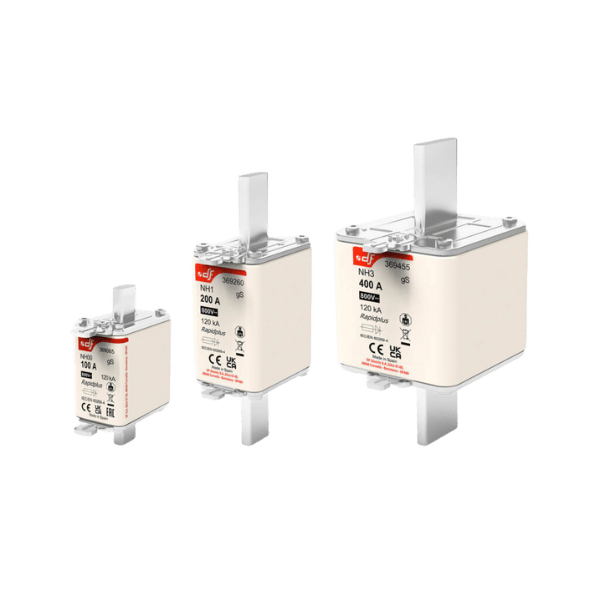
4. Low-Voltage Power Applications
NH gG 800 VAC fuses are perfect for string inverters, capacitor banks, and other low-voltage AC outputs (up to 800 V AC, 80 kA breaking).
Features include:
- Ceramic body handles thermal shocks & internal pressure
- Silver- or nickel-plated blade contacts
- Works in 42–62 Hz, –40 °C to +80 °C
- Fits NH ST bases & BS-type 3-pole disconnectors
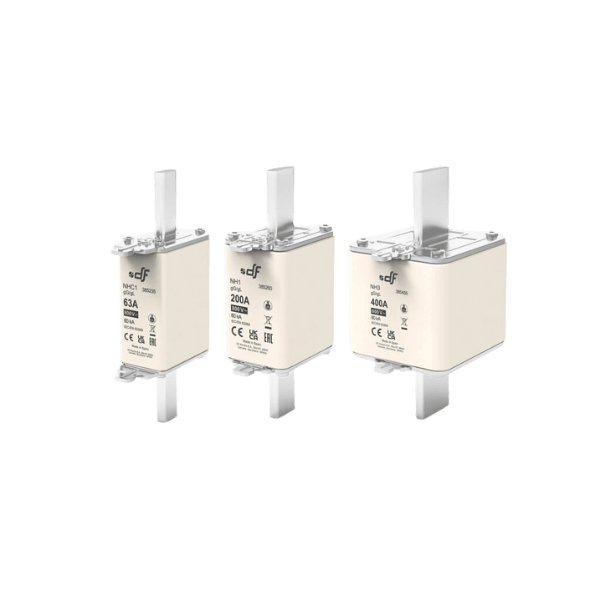
Which Fuses holders and bases are recommended for photovoltaic applications?
1. DC Photovoltaic Strings
PMX PV fuse holders are modular and robust, supporting all gPV cylindrical fuse sizes.
Features include:
- Halogen-free, self-extinguishing thermoplastics
- Quick DIN rail mounting, IP20 protection
- Integrated handle for safe, easy fuse removal
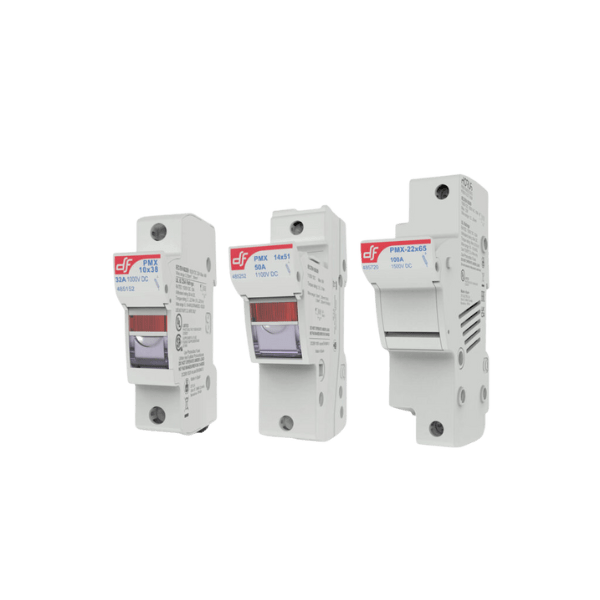
2. Up to 1500 V DC Strings
PML-e fuse holders are a compact and efficient option for 10x85 mm and 10/14x85 mm gPV fuses, rated up to 1500 V DC / 32 A.
Features include:
- Silver-plated copper contacts
- Ventilated design for heat dissipation
- DIN rail mount, IP20 protection, 8 kV impulse withstand
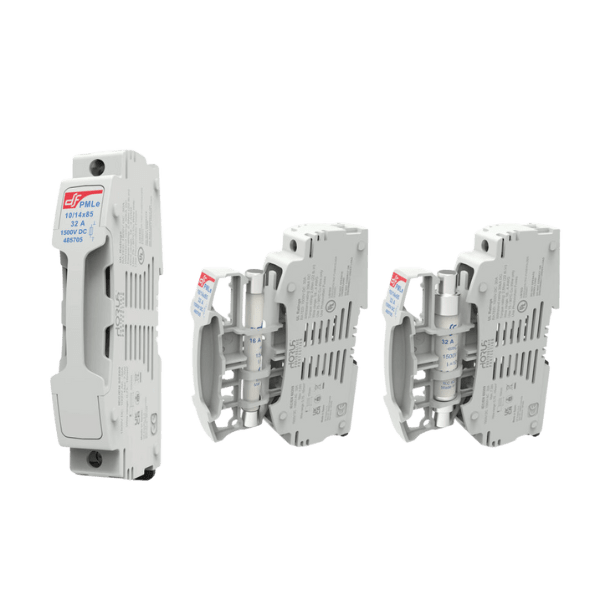
3. Medium & High-Power Photovoltaic Panels
NH ST 1000 V DC fuse bases suit NH blade fuses for medium/high-power DC systems.
Features include:
- Silver-plated contacts, flame-retardant body
- IP00/IP20 protection, –20 °C to +70 °C
- Reliable and versatile for field or panel use

5. AC Photovoltaic Inverter Protection
NH ST 800 V AC fuse bases protect AC inverter outputs up to 800 V AC / 630 A.
Features include:
- Silver-plated copper contacts, self-extinguishing body
- DIN rail or screw/bracket mounting
- Available in single- or three-pole versions
- Max power dissipation up to 60 W
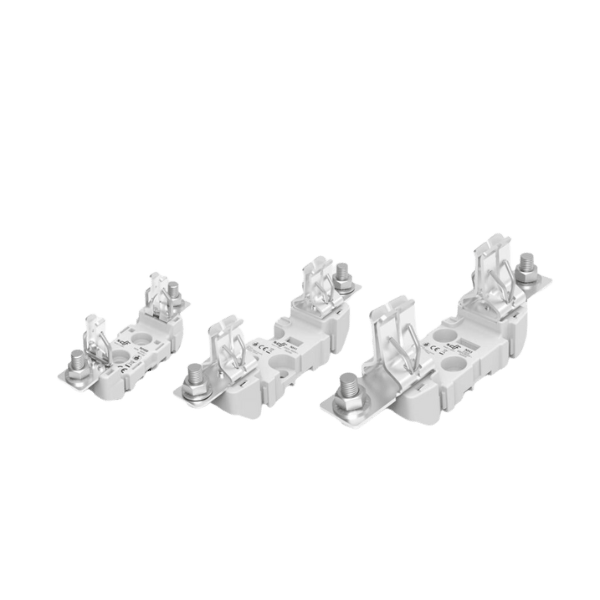
4. High-Voltage Arrays & Inverter DC Inputs
NH XL 1500 V DC fuse bases handle NH XL fuses in demanding applications.
Features include:
- Supports up to 100 kA short-circuit current
- Withstands 12 kV impulse, max power loss 85 W
- Unipolar, with spring clamp terminals for secure, accessory-ready connections
- DIN rail or bolt-on panel mounting
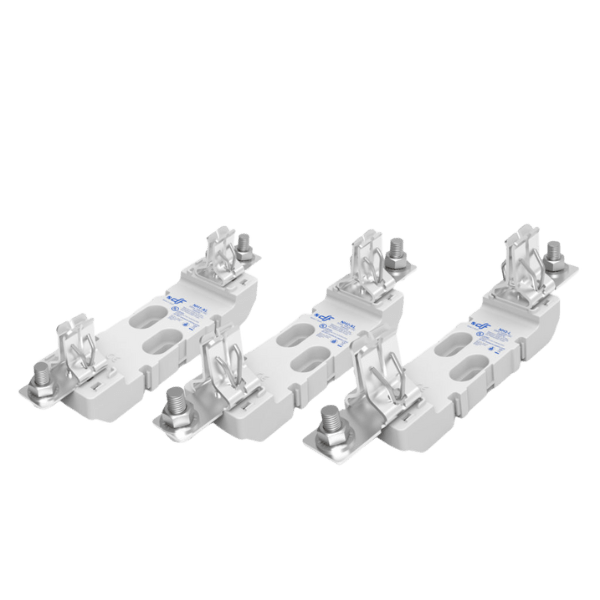
Choosing a Trusted Manufacturer
At OEM Automatic, we supply high-quality fuses and fuse holders from trusted manufacturer DF Electric. Each product is carefully selected to meet the diverse requirements of photovoltaic applications.
Our fuses/fuse holders’ specialists are here to help you select the right product based on your specific use case.
Need Help with a Photovoltaic Application?
Our Panel team is ready to assist with expert advice, product recommendations, and proof-of-concept support.
Phone: 0116 284 9900
Email: [email protected]
Live Chat: Available on our website
Onsite Support: Book a visit from one of our experienced engineers for demonstrations and application advice - email [email protected] to arrange a visit
Let us help you find the right technology for your application. Contact us today.
Related products

gPV Cylindrical Fuse Links
- Designed to protect photovoltaic systems
- Current ratings up to 20A
- Able to withstand thermal stresses typically encountered by PV systems
- Breaking capacity of 3kA

gPV NH fuse links 1000V DC
gPV NH
- Short-circuit and overload protection designed for photovoltaic installations
- Rated current ranges from 25A up to 200A
- Characteristics in accordance to IEC 60269 and UL248-19
- Ceramic body with high resistance to internal pressure and thermal shock
- Bolted versions available to mount directly on busbar

gPV NH XL fuse links 1500V DC
gPV NH XL
- Short-circuit and overload protection designed fo photovoltaic applications
- Rated voltage of 1500VDC and current ranges between 40A up to 500A
- Meets industry standards according to class according to IEC 60269 and UL248-19.
- Ceramic body with high resistance to internal pressure and thermal shock

gG/gL NH fuse links 800V AC
gG/gL NH
- overloads and short-circuit protection for photovoltaic inverters
- Fuses rated from 25A up to 400A
- Standards include IEC/EN 60269-1 and IEC/EN 60269-2
- Rated voltage up to 800VAV

gS NH fuse links 800V AC
gS NH
- Fuses designed for protecting photovoltaic inverters
- Rated breaking capacity up to 120kA
- Rated currents between 25A up to 400A
- Standards include: IEC/EN 60269-1 IEC/EN 60269-4
- Rated voltage up to 800VAC

PMX PV fuse holder 1000V DC for cylindrical photovoltaic fuses
PMX PV Fuse Holders
- Rated up to 100A
- UL Approved
- 1000VDC and 1500VDC rated voltages
- 1 pole or 2 pole options

PMLe 10/14×85 PV fuse holder 1500V DC
- Rated up to 1500VDC and 32A
- UL approved
- Compatible with 10x85 or 10/14x85 cylindrical gPV fuses
- IP20 touch safe

NH ST fuse bases 1000V DC
- 1000V DC rated Voltage
- UL Certified
- For fuse links with breaking capacity up to 120 kA
- Available in NH1, NH2 and NH3 sizes

NH XL fuse bases 1500V DC
- Rated up to 1500VDC
- UL Approved
- NH1, NH2 & NH3
- Screw terminals

NH ST fuse bases 690V/800V
- Rated current up to 2500A
- Suitable for fuse sizes between NH00 up to NH4
- Single pole and three pole variants
- Various terminal connection types